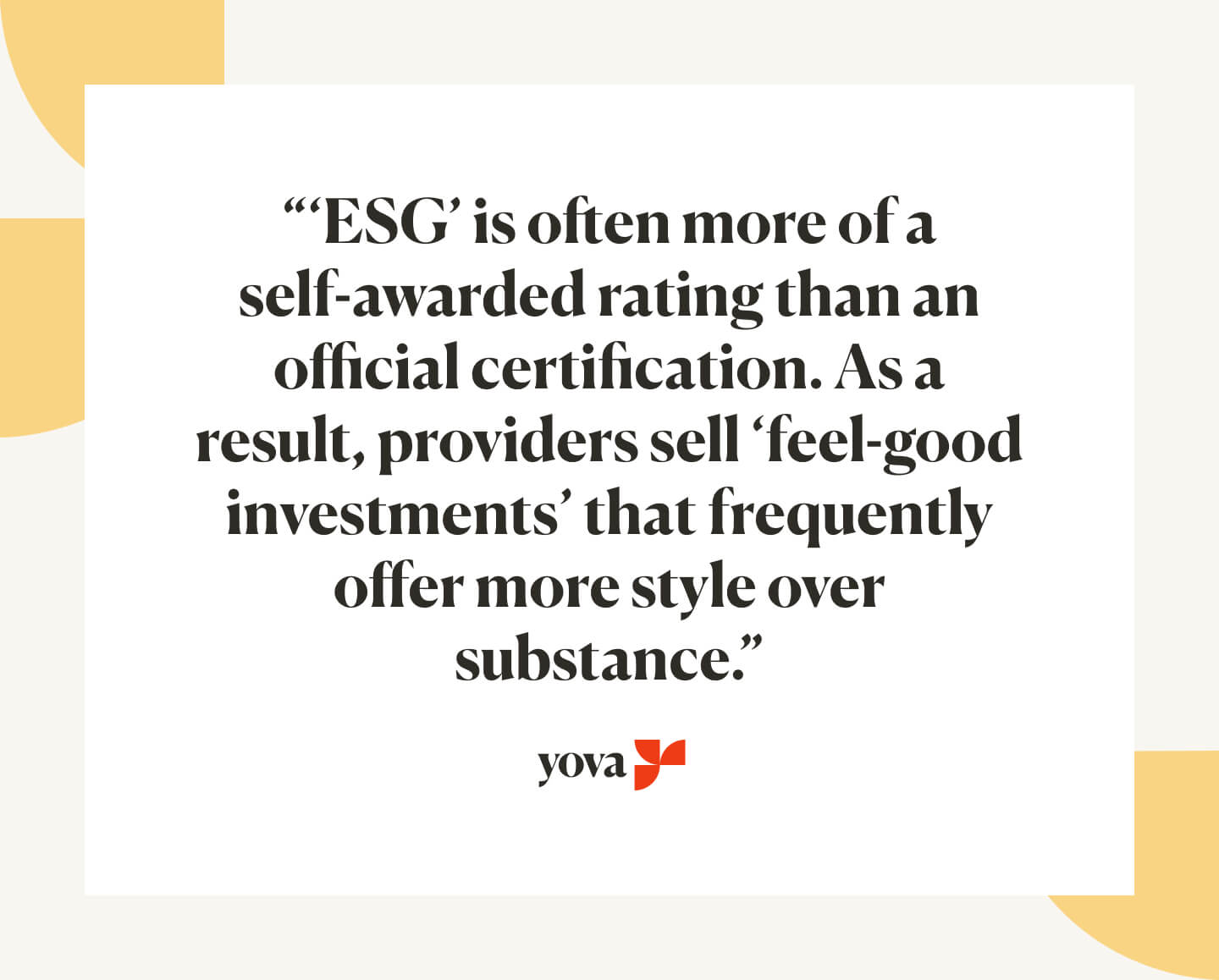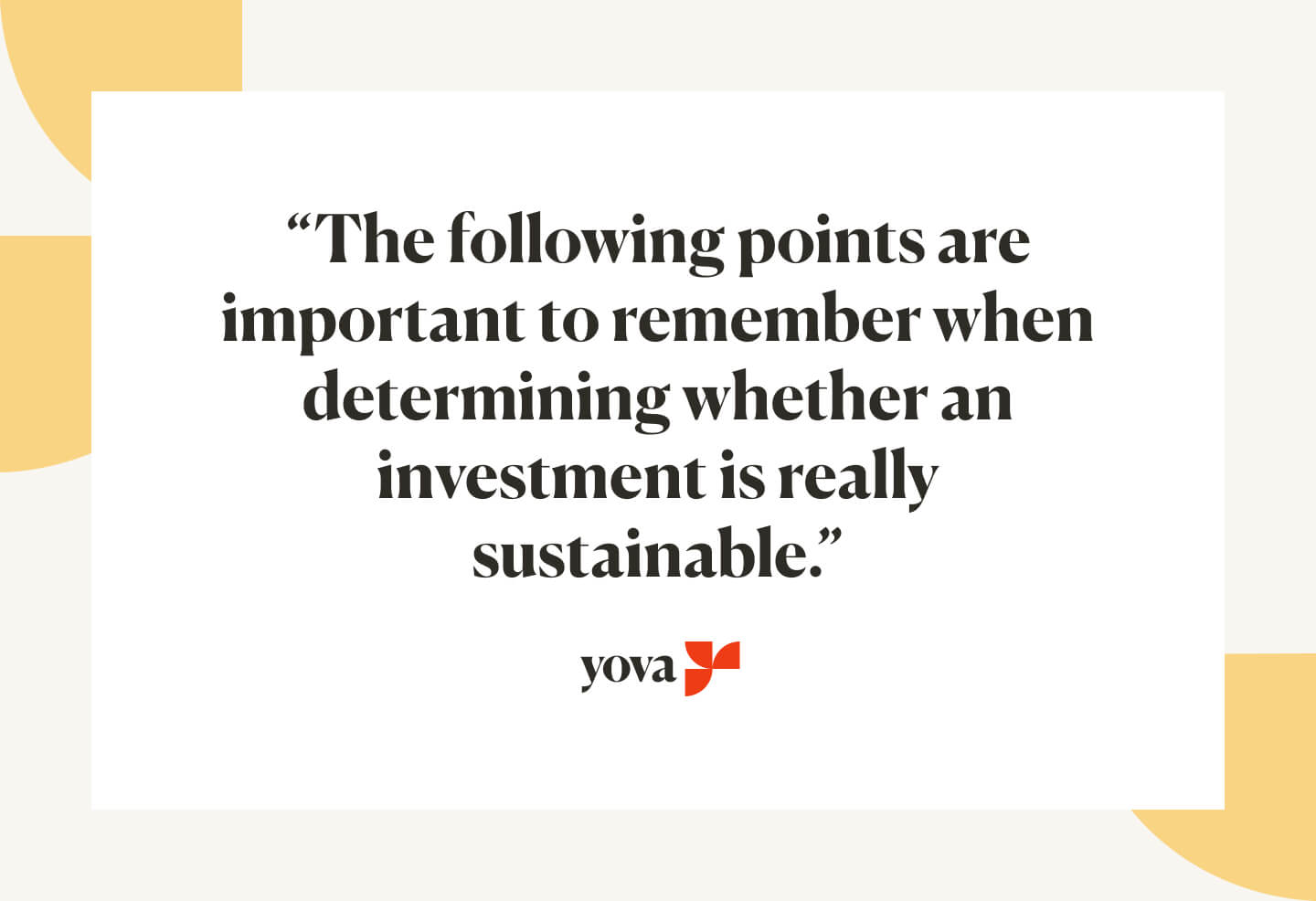Sadly but not surprisingly, just because something is labelled ‘sustainable’ doesn’t mean it actually is sustainable. Yet, very few people realise how limited the sustainability in financial products actually is.
Sustainability funds are booming and for good reason. Who doesn’t want to make money and feel great about it? But what if we take a closer look? Here’s where your values come into play. If you’re serious about climate change, equal opportunities and human rights, sustainable Exchange Traded Funds (ETFs) might not be for you. The reason being, they are often based on ESG scores without any transparency on what ‘ESG scores’ even mean.
What does ESG mean?
ESG stands for Environmental, Social and Governance. These are the dimensions along which the sustainability of companies is often evaluated for the majority of sustainable ETFs.
Technically, this is a good idea, if it weren’t for two major problems: First, every company can (and does) define its own ESG guidelines. Second, there is no official body that reviews and approves ESGs. This is why ‘ESG’ is more of a self-awarded label, rather than an official certification. As a result, providers sell ‘feel-good investments’ that may feel good but lack substance.
If you want to invest money, it is difficult to understand what exactly you are investing in. Typically, most of the companies that you end up financing are not even visible to you. They remain hidden from an investor’s view. Companies in indisputably harmful industries (think weapon producers) are sometimes excluded from ETFs.
But given the obscure and self-made guidelines that financial providers set themselves, we are treading in murky waters. Palm oil producers and environmentally damaging fast fashion companies easily end up in a ‘sustainable’ ETF – as well as banks that heavily finance fossil fuel extraction.

Where is the sustainability impact?
One thing ETFs almost never achieve is real impact for a better world – ‘impact’ meaning that the investment has a measurable positive effect. Another evident problem is that sustainability investors may have different interests than the companies they invest in. This is difficult to avoid, if you, as an investor, have little opportunity to know about the companies you end up investing in.
Without transparent information about all the companies in your portfolio, you cannot possibly know what activities these companies are engaged in. Furthermore, investors usually have no say in the selection of companies that make up their portfolio. If they even get to view them at all.
How do I know if it’s as green as they say it is?
Transparency is key. Without it, you don’t know if what you see is really what you get.

The following questions can help you determine whether an investment is really sustainable:
- Can I see where the money goes? Do I know, for instance, in which companies my money is invested? You’d be surprised to know that many ESG investments fail to provide even this basic information, or require massive effort to find it.
- Does the provider disclose the criteria used to assess companies? Many ETFs label themselves as ‘responsible’ or ‘sustainable’, only because they exclude weapon manufacturers. That is not enough.
- Which data is used to evaluate the companies? Is it only the information from the company itself, or are independent data providers and analyses an important factor in the assessment?
It is definitely possible for investment providers to offer this transparency. At Inyova, for example, an investor always sees every single company in their portfolio. On top of that, we provide every investor with documentation on all of the evaluation mechanisms and data sources for all portfolios as well as in a whitepaper.
We openly communicate the selection criteria for our portfolio: We analyze and choose our companies based on a wide range of data from independent sources, taking environmental and social aspects into account:
- We go beyond the numbers, and into the media and the hidden corners that our companies do not proudly present on their websites.
- We meticulously examine the entire product lifecycle: from the extraction of raw materials to production, use, repair and recycling. This entails not only analysing the handprint of a company (WHAT are the important issues that the company addresses with its products and services?), but also its footprint (HOW does the company operate?).
- We live for transparency. With us, every investor sees every single company they’re invested in. They know every company’s sustainability strengths and weaknesses and understand why it is in their portfolio.
- We identify the industry champions and pay attention to their (future) developments. We also consider working with industries that are vital for our society, even if not 100% clean.
- We stay abreast of current events that may affect our portfolios and monitor whether the values of our companies continue to correlate with the values of our investors.
- We turn our clients into ‘impact investors’ by making them active co-owners of the companies in their portfolio.
Our promise: If you invest with us, you’ll always know what happens with your money and who is involved. We also take pride in being held accountable for it.


